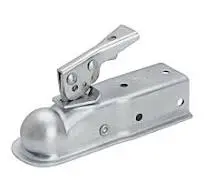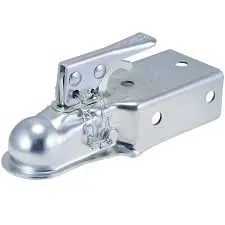Can a Ball Coupler be Used on All Types of Trailers?
2025-02-25 14:42:19
When it comes to towing trailers, one of the most crucial components is the ball coupler for trailer. This essential piece of equipment connects the trailer to the towing vehicle, ensuring a secure and stable connection during transport. However, many trailer owners and enthusiasts often wonder about the versatility of ball couplers and whether they can be used universally across different types of trailers. In this comprehensive guide, we'll explore the intricacies of ball couplers, their compatibility with various trailer types, and important considerations for safe and effective towing. Whether you're a seasoned trailer user or new to the world of towing, this article will provide valuable insights to help you make informed decisions about your trailer hitch setup.

Understanding Ball Couplers and Their Function
What is a Ball Coupler?
A ball coupler is a crucial component in a trailer hitch framework, planned to encourage secure towing. This cup-shaped gadget fits over the hitch ball of the tow vehicle, safely interfacing the trailer’s tongue to the vehicle. It guarantees that the trailer remains solidly joined amid travel, avoiding division or flimsiness. ball couplers for trailer come in different sizes and plans to coordinate diverse towing needs, making them a flexible and basic component for anybody utilizing trailers for pulling cargo, recreational vehicles, or gear.
How Ball Couplers Work?
The operation of a ball coupler is based on a direct however dependable plan. The coupler is made to fit cozily over the ball mount, with common sizes being 1-7/8", 2", or 2-5/16" in breadth. When the coupler is brought down onto the ball, the locking mechanism—typically a hook or lever—engages, securing the association. This component anticipates inadvertent separation whereas the vehicle is in movement. The ball coupler’s plan guarantees a tight, secure fit, permitting the trailer to be securely towed without chance of detachment.
Key Components of a Ball Coupler
A ball coupler comprises a few critical components that contribute to its work and security. The fundamental portion is the coupler body, which houses the attachment that fits over the hitch ball. The locking component, frequently a lever or hook, guarantees the coupler remains safely joined. Security chains are an extra safeguard, connecting the trailer to the tow vehicle in case of disengagement. Alteration jolts permit for fine-tuning the arrangement and pressure of the coupler, guaranteeing a solid, secure association. Appropriate upkeep of these components is significant for long-term usefulness.
Compatibility of Ball Couplers with Different Trailer Types
Factors Affecting Ball Coupler Compatibility
While ball couplers are widely used, their compatibility with different trailer types depends on several factors:
- Trailer weight and load capacity
- Coupler size and ball mount diameter
- Tongue weight of the trailer
- Type of trailer (e.g., utility, boat, RV)
- Legal regulations and standards in your area
These factors play a crucial role in determining whether a specific ball coupler for trailer is suitable for your particular setup.
Common Trailer Types and Their Coupler Requirements
Different trailer types often have specific coupler requirements:
- Utility trailers: Often use 1-7/8" or 2" ball couplers
- Boat trailers: May require 2" or 2-5/16" couplers, depending on boat size
- RV trailers: Typically use larger 2-5/16" couplers due to heavier loads
- Horse trailers: Often require 2-5/16" couplers for added stability
- Car trailers: Usually need 2" or 2-5/16" couplers, based on vehicle weight
Understanding these requirements helps in selecting the appropriate ball coupler for your specific trailer type.
Adapting Ball Couplers for Different Trailers
In some cases, it's possible to adapt ball couplers for use with different trailer types:
- Using adapters to change coupler sizes
- Upgrading to adjustable couplers for versatility
- Installing weight distribution systems for heavier loads
- Considering specialized couplers for unique trailer designs
However, it's crucial to ensure any adaptations comply with safety standards and manufacturer recommendations.

Safety Considerations and Best Practices for Ball Coupler Usage
Proper Installation and Maintenance
To ensure safe and reliable operation, proper installation and maintenance of ball couplers are essential:
- Regular inspection of the coupler for wear, damage, or corrosion
- Lubricating moving parts to prevent seizing
- Checking and adjusting the locking mechanism for secure fitment
- Ensuring proper alignment between the coupler and ball mount
- Verifying that safety chains are properly attached and in good condition
These maintenance practices help prevent accidents and extend the lifespan of your trailer hitch system.
Weight Ratings and Load Limits
Understanding and adhering to weight ratings is crucial for safe towing:
- Always check the gross trailer weight (GTW) rating of your coupler
- Ensure the coupler's weight capacity exceeds your trailer's fully loaded weight
- Consider the tongue weight, which typically should be 10-15% of the total trailer weight
- Be aware of your vehicle's towing capacity and never exceed it
- Use a weight distribution hitch for heavier loads when necessary
Respecting these weight limits is essential for safe towing and preventing damage to your vehicle and trailer.
Legal Requirements and Regulations
When using ball couplers for trailers, it's important to be aware of legal requirements:
- Ensure your coupler meets local and national safety standards
- Check for any specific regulations regarding trailer hitches in your area
- Verify that your trailer lighting and braking systems comply with regulations
- Consider obtaining regular safety inspections for your trailer and hitch system
- Stay informed about any changes in towing laws and regulations
Adhering to these legal requirements not only ensures safety but also helps avoid potential fines or legal issues.
Conclusion
Ball couplers for trailers are versatile components that can be used on many trailer types, but proper selection, installation, and maintenance are crucial. Always prioritize safety and consult with professionals when in doubt about compatibility or usage. If you want to get more information about this product, you can contact us at info@qdkshd.com.
References
1. "Trailer Hitch Ball Couplers: A Comprehensive Guide" - Towing Safety Magazine
2. "Choosing the Right Ball Coupler for Your Trailer" - RV Today
3. "Safety Considerations in Trailer Towing" - National Highway Traffic Safety Administration
4. "Understanding Trailer Weight Ratings and Capacities" - Trailer Life
5. "Legal Requirements for Trailer Hitches: A State-by-State Guide" - American Trucking Association
6. "Maintenance Tips for Long-Lasting Trailer Couplers" - Trailer Tech Monthly
Send Inquiry
You may like
